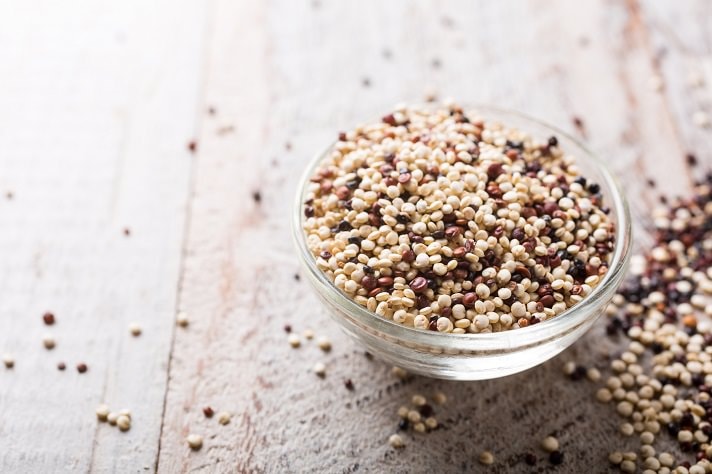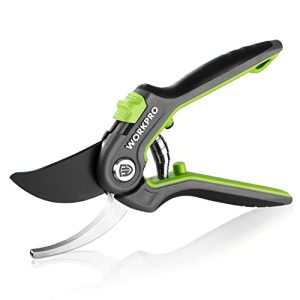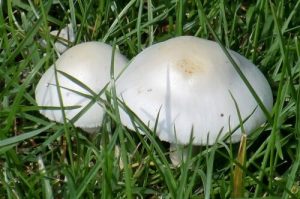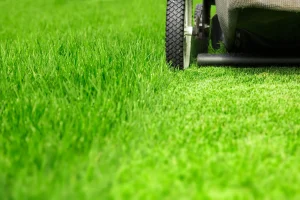Are you curious about adding variety to your feathered friends’ diet? You’re not alone!
Many bird enthusiasts like you are exploring different food options to ensure their birds stay healthy and happy. Quinoa, the superfood loved by humans, has caught your attention, but you’re wondering, “Can I feed quinoa to birds? ” This question is more common than you might think, and the answer might surprise you.
Imagine your birds chirping with delight as they enjoy a tasty, nutritious treat that enhances their well-being. By the end of this article, you’ll have all the insights you need to make informed decisions about feeding quinoa to your birds. Let’s dive in and uncover the benefits and considerations of this intriguing choice!

Nutritional Profile Of Quinoa
Quinoa is often celebrated as a superfood, but did you know it can also be beneficial for birds? Whether you’re an avid bird watcher or someone who keeps pet birds, understanding the nutritional profile of quinoa can help you make informed decisions about their diet. Quinoa is packed with protein, essential amino acids, and a variety of vitamins and minerals, all of which contribute to a balanced diet for birds. Let’s dive into each of these components to see how they can support your feathered friends.
Protein Content
Quinoa is a great source of protein, offering around 8 grams per cup when cooked. This can be a valuable addition to a bird’s diet, especially for growing chicks or birds in breeding season. Protein is crucial for muscle development and the overall health of birds. Imagine the energy and vitality your bird can gain by adding quinoa to their meals. Have you ever wondered how such a tiny seed could pack such a punch?
Essential Amino Acids
Quinoa contains all nine essential amino acids, making it a complete protein source. These amino acids are vital for maintaining healthy feathers and supporting metabolic processes. Birds need these building blocks for optimal health, just like humans do. Consider how the variety of amino acids in quinoa can complement the seeds and grains you typically feed your birds. Isn’t it fascinating how nature provides these essentials in such a compact form?
Vitamins And Minerals
Quinoa is rich in various vitamins and minerals, including magnesium, phosphorus, and manganese. These nutrients support bone health, energy production, and immune function in birds. Vitamins like B and E found in quinoa can enhance your bird’s vitality and well-being. Next time you prepare quinoa for yourself, think about sharing a portion with your birds. Can you picture them enjoying the benefits of this nutrient-rich food?
Quinoa is more than just a trendy food for humans; it can be a valuable addition to your bird’s diet. By understanding its nutritional profile, you can make informed choices that benefit your feathered companions. How will you incorporate quinoa into your bird’s meals today?
Benefits Of Quinoa For Birds
Quinoa offers birds a protein-rich meal, supporting their growth and feather health. It provides essential amino acids and minerals. Easy to digest, it can be a nutritious addition to their diet.
Quinoa has emerged as a nutritional powerhouse not just for humans but also for our feathered friends. This tiny seed, often mistaken for a grain, is packed with essential nutrients that can greatly benefit birds. If you’ve ever wondered about improving your bird’s diet, quinoa might just be the answer. Let’s dive into how this superfood can support your bird’s health in various ways.Digestive Health
Quinoa is rich in fiber, which aids in digestion. Birds often suffer from digestive issues due to a poor diet. Adding quinoa can help keep their digestive system in check. Fiber helps in smooth bowel movements, reducing the risk of constipation. Think about how much better your bird could feel with improved digestion. Does your bird seem sluggish or uncomfortable? Introducing quinoa might just be the solution to enhancing its digestive health.Energy Source
Quinoa is a fantastic source of energy. Its complex carbohydrates provide a steady release of energy, keeping birds active and alert. Unlike sugary foods that cause energy spikes, quinoa offers a consistent energy boost. This means your bird can enjoy playtime without tiring quickly. Have you noticed your bird looking lethargic? A diet including quinoa can help maintain its energy levels throughout the day.Feather Health
Feathers are crucial for birds, and quinoa contributes to their health. Packed with protein and essential amino acids, quinoa supports feather growth and repair. Healthy feathers are a sign of a well-nourished bird. Quinoa can enhance their shine and strength, making your bird look vibrant. Ever seen dull or damaged feathers? Adding quinoa to your bird’s diet could promote healthier and more resilient feathers. Quinoa might be the missing piece in your bird’s diet puzzle. As you explore feeding quinoa to your birds, consider these benefits and observe the positive changes in their health.Potential Risks And Considerations
Feeding quinoa to birds can pose risks. Some birds might struggle to digest it properly, leading to digestive issues. Always introduce new foods slowly and observe any adverse reactions or changes in behavior.
Feeding quinoa to birds can be a healthy addition to their diet, but it’s important to be aware of the potential risks and considerations involved. While quinoa is a nutritious grain, not all birds may react positively to it. Understanding these risks will help you make informed decisions about what to include in your feathered friend’s meals.Overfeeding Concerns
Birds have unique dietary requirements, and overfeeding quinoa could lead to nutritional imbalances. Birds require a variety of nutrients that quinoa alone may not provide. If you notice your bird becoming less active or gaining weight, it might be a sign of overfeeding. Keep an eye on portion sizes. A small amount mixed with other foods can be beneficial, but quinoa should not be the main component of their diet. Consider how much quinoa your bird is consuming relative to their regular seed mix.Allergic Reactions
Just like humans, birds can have allergic reactions to certain foods. Although quinoa is generally safe, some birds might experience adverse effects. Look for signs such as itching, sneezing, or changes in behavior after eating quinoa. If your bird shows any unusual symptoms, it might be wise to consult a veterinarian. Always introduce new foods gradually to monitor for any allergic reactions.Preparation Methods
Quinoa requires proper preparation before serving it to birds. Raw quinoa can be difficult to digest. Cooking it until soft makes it easier for birds to eat and digest. Avoid adding salt or spices when preparing quinoa for your bird. These can be harmful to their health. Consider rinsing quinoa thoroughly to remove saponins, a naturally occurring compound that may be bitter and potentially irritating. How do you prepare quinoa for your bird? Does your bird enjoy it cooked or raw? Experiment with different methods while ensuring their safety and health.Best Practices For Feeding Quinoa
Birds can enjoy quinoa as a nutritious treat. Serve it cooked or sprouted for easier digestion. Moderation is key to maintaining a balanced diet.
Feeding quinoa to birds can be a delightful and nutritious addition to their diet. However, it’s crucial to approach this with the right practices to ensure their health and well-being. You might wonder how to make quinoa a regular part of their diet without overdoing it. Here, we’ll explore some best practices for feeding quinoa to your feathered friends, focusing on cooking tips, mixing it with other foods, and monitoring portion sizes.Cooking And Serving Tips
Cooking quinoa for birds is simple. Start by rinsing the quinoa thoroughly to remove saponins, which can be harmful. Boil it in water until it’s soft but not mushy. Avoid adding salt or spices that might upset their stomachs. Serve quinoa at room temperature. Birds appreciate variety, so you might consider mixing in chopped fruits or vegetables for added flavor and nutrition. Think of colors and textures that could intrigue them, like diced carrots or apple slices.Incorporating With Other Foods
Quinoa is great on its own but can be even better when mixed with other healthy foods. You might add some seeds, nuts, or grains to create a balanced meal. Consider mixing it with millet or sunflower seeds to offer a diverse palate. Have you tried adding cooked quinoa to a bird’s regular seed mix? This simple change could spark new interest in their meals, making feeding time more engaging for them. Experiment with different combinations to keep their diet exciting and nutritious.Frequency And Portion Control
While quinoa is nutritious, moderation is key. Aim to feed quinoa to birds once or twice a week to prevent any dietary imbalance. Overfeeding can lead to weight gain and health issues. Portion control is crucial. Use small amounts—about a tablespoon per serving for small birds. Monitor their reactions and adjust portions if you notice any changes in behavior or health. How often do you check the portion sizes for your bird’s meals? Reflect on this and make sure you’re not overloading their dishes. Balance is essential for maintaining their health and happiness. Incorporating quinoa into your bird’s diet can be a rewarding experience. By following these simple guidelines, you can ensure your feathered friends enjoy their meals safely and healthily.Comparing Quinoa With Other Grains
Birds can enjoy quinoa as a nutritious treat. This grain provides essential nutrients, similar to other grains. Its high protein content benefits bird health.
When feeding birds, choosing the right grains is crucial. Quinoa has gained popularity for its nutritional benefits. But how does it compare with other grains? Let’s dive into its nutritional profile, bird preferences, and cost.Nutritional Comparisons
Quinoa is rich in protein and essential amino acids. It contains more protein than rice or corn. Birds benefit from its high fiber content. It also provides vitamins and minerals. Compared to oats, quinoa offers a balanced nutrient mix. While oats are high in fiber, quinoa delivers more protein. This makes quinoa a versatile choice for birds.Bird Preferences
Birds may have varied tastes. Some birds enjoy quinoa’s texture and flavor. It can attract finches and sparrows. Larger birds may prefer grains like corn or millet. Mixing quinoa with seeds can enhance bird diets. Observing birds can help determine their grain preference. Offering a variety ensures all birds find something they like.Cost And Availability
Quinoa can be pricier than other grains. Availability varies by region. Grocery stores often stock quinoa. Specialty stores may offer bulk purchasing options. Rice and corn are generally cheaper. They are widely available in most places. Comparing prices can help manage feeding costs. Balancing cost with nutritional value is important for bird care.
Expert Opinions And Studies
Bird enthusiasts often wonder about the benefits of quinoa for birds. Many experts have shared their insights on this topic. Several studies have also been conducted. This section covers expert opinions and studies on feeding quinoa to birds.
Veterinarian Insights
Veterinarians suggest quinoa can be a good addition to bird diets. It provides essential nutrients. Quinoa is rich in protein and fiber. These nutrients support birds’ health and energy. Many veterinarians recommend cooked quinoa. Cooking makes it easier for birds to digest. It’s important to introduce quinoa gradually. This helps monitor any allergic reactions in birds.
Research Findings
Research shows quinoa is safe for most birds. Studies highlight its nutritional benefits. Quinoa contains amino acids. These are crucial for bird growth and repair. Research indicates quinoa supports feather health. It also aids in digestion due to its fiber content. Scientists have found no harmful effects from quinoa. This makes it a reliable food source.
Case Studies
Several bird owners have shared positive experiences with quinoa. A case study involved parakeets. Owners noticed improved energy levels. Birds showed shinier feathers after quinoa was added. Another case involved parrots. They enjoyed quinoa mixed with other seeds. Owners reported better digestion in these birds. These real-life examples support quinoa’s benefits.

Frequently Asked Questions
How To Prepare Quinoa For Birds?
Rinse quinoa thoroughly to remove saponins. Cook it in water until soft. Let it cool completely. Serve plain or mix with fruits and vegetables suitable for birds. Store any leftovers in the refrigerator. Always provide fresh water alongside quinoa to ensure proper hydration.
Avoid adding salt or seasoning.
What Are You Not Supposed To Feed Birds?
Avoid feeding birds chocolate, caffeine, salty snacks, and alcohol. These are toxic and harmful. Avoid onions, garlic, and avocados too. Bread offers no nutritional value and can lead to malnutrition. Stay away from processed foods and sugary items. Provide safe seeds and grains instead.
What To Do With Expired Quinoa?
Check for any signs of spoilage like mold or unusual odor. Use expired quinoa as compost or bird feed if it’s safe. Avoid cooking or consuming it if it shows spoilage signs. Always store quinoa properly to extend its shelf life.
What Grains Are Good For Birds?
Birds enjoy grains like millet, oats, quinoa, and barley. These grains provide essential nutrients and energy. Whole grains are preferable as they offer more fiber. Avoid processed grains with additives. Ensuring variety in grains helps meet birds’ nutritional needs and keeps them healthy.
Conclusion
Feeding quinoa to birds can offer nutritional benefits. It’s rich in protein and minerals. Birds enjoy variety in their diet. Quinoa adds that. But moderation is key. Too much can upset their balance. Always rinse quinoa before serving. Removes any bitter residue.
Mix it with other seeds or fruits. Birds appreciate diverse meals. Observe your bird’s response. Some may prefer it cooked. Others raw. Every bird is unique. Adjust portions accordingly. Keep their diet balanced and healthy. A little quinoa can enhance their menu.
Your feathered friends will thank you.






